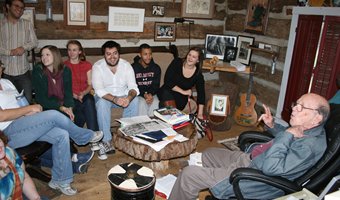By Bob Allen
Will Campbell, an author, activist and iconoclastic Baptist minister who described himself as a “bootleg preacher,” died June 3 from complications following a stroke suffered in 2011. He was 88.
 The Mississippi native was one of the more enigmatic champions of the Civil Rights movement. He helped escort nine African-American students through mobs opposed to the desegregation of Central High School in Little Rock, Ark., and was the only white minister invited by Martin Luther King Jr. to attend creation of the Southern Christian Leadership Conference.
The Mississippi native was one of the more enigmatic champions of the Civil Rights movement. He helped escort nine African-American students through mobs opposed to the desegregation of Central High School in Little Rock, Ark., and was the only white minister invited by Martin Luther King Jr. to attend creation of the Southern Christian Leadership Conference.
At the same time, he befriended integration opponents that he called “the Kluxers,” earning him the designation of chaplain to the Ku Klux Klan. “If you’re gonna love one, you’ve got to love ’em all,” he would often say.
Campbell wrote numerous books from his farm in Mount Juliet, Tenn., described in his 1986 memoir Forty Acres and a Goat.
Brother to a Dragonfly, a tribute he wrote to his brother in 1977, won a National Book Award nomination and was named one of Time magazine’s 10 most notable works of nonfiction of the decade.
Campbell’s 1982 book, The Glad River, was named Friends of American Writers first place winner. His other major works include The Stem of Jesse and The Convention: A Parable, an allegory based on conflict between moderates and fundamentalists in the Southern Baptist Convention, released in 1988.
 He is best known, however, as part of the inspiration for “Rev. Will B. Dunn,” the parson from the late cartoonist Doug Marlette’s comic strip “Kudzu.”
He is best known, however, as part of the inspiration for “Rev. Will B. Dunn,” the parson from the late cartoonist Doug Marlette’s comic strip “Kudzu.”
Campbell won a National Endowment for the Humanities medal in 2000 and received lifetime achievement awards from the American Civil Liberties Union of Tennessee and the Tennessee chapter of the National Conference of Christians and Jews. Yale Divinity School gave him the William Sloane Coffin Award for Peace and Justice in 2007.
Born July 18, 1924, in Amite County, Miss., Campbell was educated at Wake Forest University (then College) and Yale Divinity School. He held a brief pastorate in Louisiana before realizing a traditional parish ministry was not for him. “Either the steeples weren’t ready for me or I wasn’t ready for the steeples,” he said.
He took a job as director of religious life at the University of Mississippi in 1954, but resigned after two years when his support for racial integration drew hostility, including death threats.
He then took a position as a field officer for the National Council of Churches, a job that put him on the front lines of the Civil Rights Movement.
Campbell left the NCC in 1963 to become director of the Committee of Southern Churchmen, an association of white liberals formed in the latter years of the Civil Rights Movement. The organization’s flagship publication, Katallegete, took its title from a word in the Greek New Testament translated in II Cor. 5:20 as “be reconciled.”
Though he enlisted in the Army during World War II, Campbell protested the Vietnam War and helped draft resisters find sanctuary in Canada. He opposed both abortion and the death penalty, and was friends with country music legends including Kris Kristofferson and Tom T. Hall.
Writer John Egerton notified friends of Campbell’s death in an e-mail Tuesday morning. Egerton said Campbell’s condition had been declining gradually for about a month and turned suddenly critical over the weekend. He died shortly after 10 p.m. Monday, surrounded by family in Room 331 at Richland Place in Nashville, Tenn.
“He had fought for two years to recover from the May 2011 stroke that disabled him, and he was weary of the struggle,” Egerton said. “In a final act of benevolence, Will spared them all the anguish of a long and traumatic last watch.”
“For him and for his family, his departure was not a cry of despair; it was more like a whispered sigh of relief,” Egerton reported. “Finally, he is at peace.”
Survivors include his wife, Brenda, whom he married in 1946, three children and four grandchildren. His remains will be cremated, and a memorial service will be held in Nashville later this month.
Also see:
